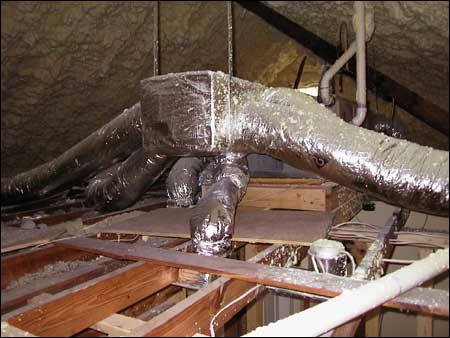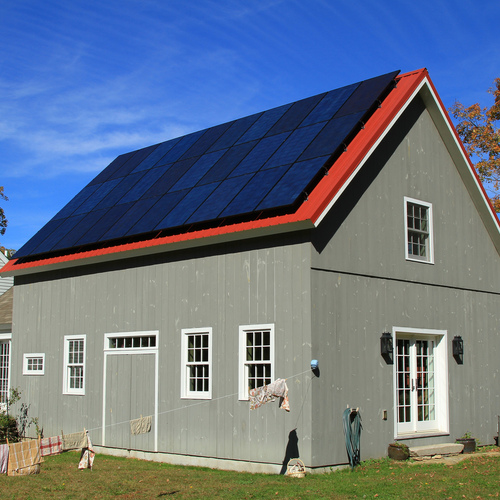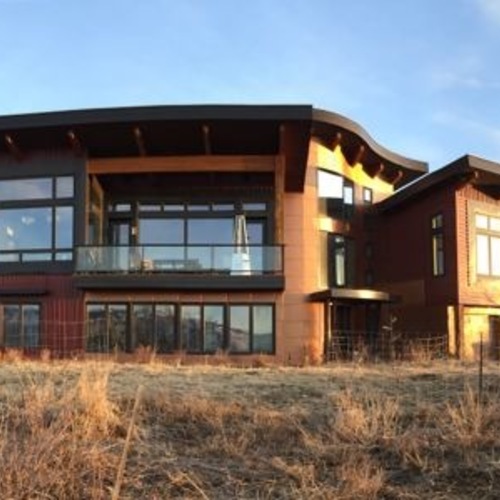
Sometimes the complexity of building science makes me a little crazy. The worst manifestation of this is when I make recommendations to clients or building pros at meetings or in seminars. Rarely is there a single, clear-cut solution to most problems. “It depends” is usually the right answer. It depends on the climate. It depends on the materials used. It depends on existing conditions. It depends on so many things that the average person slips quickly into MEGO mode (My Eyes Glaze Over).
I’m not really complaining, as I tend to prefer complicated problems and dislike repetition, so the ambiguities of green building seem to fit my personality. But what makes me happy doesn’t necessarily make it easy for other people, and unfortunately, we need to make building science (and green building in general) much easier to implement in order to get enough market penetration to make a difference.
Complexity = job security
Can we come up with something straightforward and simple to execute? I hope that we can, but I am concerned both that it may not be possible and that I may have a vested interest in delaying simplification. As long as it remains complicated, people will need my services (and those of lots of friends and associates), so in my own warped way I see it as a form of job security.
For new homes, we have several national and over 100 local certification programs to choose from, varying in both rigor and administration from marginal to excellent. The most consistent feature about them is that few of them are easy for the general public to understand and for homebuilders to use in their work. I think it is time to rethink the tools we have to help us make our buildings better. We need to make them both easy and accessible to the industry and the public. I don’t know how we are going to do this, but I believe that it is possible and necessary for us to transform our new housing stock.
Forget new homes
But when we focus so much attention on new homes, we miss our biggest opportunity for improvements: existing homes. There will always be more existing than new homes, and no matter what their age, they need lots of help. My best hope for existing homes is Home Performance with Energy Star, which, while still a work in progress, does a good job of guiding the analysis, testing, and executing energy improvements in existing homes. Unfortunately, based on the serious lack of knowledge of what constitutes a quality home, the tight economy, and the general lack of interest in efficient buildings, Home Performance has not made the inroads into the marketplace that it deserves.
If we are able to simplify the process so that it is accessible to enough people to make it mainstream, will it be rigorous enough to make a difference? Will we have to choose between a weak program with strong market penetration or a strong one with weak market share? Right now, we have three main national certifications that focus mostly on new homes: NAHB, LEED, and Energy Star. NAHB and LEED are both very complex to administer, which, in my humble opinion, keeps them from widespread adoption. Energy Star is less complicated and more narrowly focused, but will change dramatically with the 2011 version. But combined, they still represent only a small fraction of all new homes being built, and an even smaller fraction of remodeled homes, which raises questions about what we should do with all those existing homes.
Dreaming
I have long dreamed of a very intuitive system that quickly, simply, and accurately provides the best answers for any question or situation in home performance. I truly believe that it is possible to create a tool like this, but it may be too big (read: costly) a challenge to make it economically viable. And in the meantime, I suppose I still have some job security, at least for the time being.
Weekly Newsletter
Get building science and energy efficiency advice, plus special offers, in your inbox.















6 Comments
Carl,
I think the problem is
Carl,
I think the problem is we are taking something complex that can NOT be made less complicated. The American home is far from a simple, humble product. Granted it does not take a astrophysicist to design and build a quality, high performance home for the typical American, but as you pointed out, it is challenging.
I think that until we convince Americans to live in simple, modest homes (think square, uncomplicated structures) OR convince every builder, architect, and subcontractor to get the PROPER training, homebuilding will stay where it is-- complicated.
I don't believe that we can change the "American" home. Americans are Americans. Furthermore, when you combine American mentalities with more and more progressive energy codes (more insulation and air sealing) and you get a very complex home.
I do believe, however, that we can and MUST train building professionals to be better building "scientists". Now, I want to be clear-- I know this will not be easy. The training/experience required for individuals to become builders in most states is a joke, and the continuing education for license renewal is pathetic. I know that in Utah it is only 6 CEUs every two years to renew a general contractors license. So what do builders do? They take the same silly courses every two years (perhaps an " Avoiding Liens and Litigation" course, and a "Better Business Practices" course) and call it good.
The only solution to this problem that I see is for States to adopt more extensive continuing education requirements. Force these building pros to become more knowledgeable about moisture, air, and thermal control.
Now some people may say, "wo, wo wo, FORCE? Thats not a word that meshes well with builders... you want to make it an option!"
My response to this is, "Sure, in a perfect world." But we obviously do not live in a perfect world, and most builders will not go out and get the proper training on their own.
Like rebellious teenagers, sometimes builders need to be forced to do something they do not want to do.
It's all about money folks...
It's all about money folks... I agree with Carl... this shouldn't be so complicated. One of the problems with all of this... is.... the manufacturers "sell" "market" products... for a profit... and not honestly. Pink dye... added to insulation... and a pink panther... telling all of us... how good the stuff is.
Just built a tighter home... with low density foam... sealed most all of it and have a non vented roof. What a nice home this is. And no HRV. I did include bath fans that are always on with the lights. And the home has no carpet to fowl the air.
Oh and as to continuing Ed.... just another money grab.
aj
Wrong Article for The Title
Carl,
While your title was "When Will We Reach Beautiful Simplicity in Green Building?", your article was about reaching simplicity in green certification programs, which would be possible only when we return to a beautiful simplicity in building.
And James says "I don't believe that we can change the American home," so we must force builders to change their ways to better "green" ridiculously excessive homes for absurdly unsustainable lifestyles.
To which adkjac (who needs to learn than open-cell foam is NOT the answer to every question) responds, "just another money grab".
Unfortunately, it will likely require a complete economic collapse (which is likely coming) to get Americans to wake up to what basic shelter really is and for architects to either design for essential human need or get out of the way, and for builders and building consultants to put responsibility to society and the earth ahead of "job security".
Certifications vs. Sustainability
Robert - I appreciate your comment that the title of this piece doesn't necessarily accurately represent the content, and perhaps I did stray too far into certifications than i could have. I do think that certification programs (when they are effective) are the best way to get the average person (homeowner, builder, subcontractor) to make the transition to green or sustainable building. I recognize that green building programs are a stepping stone to true, long term sustainable building as a standard. I hope (but don't necessarily expect) that the term "green" as it refers to buildings will ultimately become obsolete, as both codes and enforcement of them continue to raise the bar beyond what we now consider green. Until then, there is a lot of work to do for all of us.
As to who does what in this area, I think that we all have a part to play. I see you, and others like you as being on the cutting edge of research and implementation, pushing the envelope to its limits regularly. Unfortunately, the entire industry and our society cannot change overnight, and I believe that we need to rely in incremental improvements by average people as we move towards better buildings. I see myself as one of many people that work to communicate new ideas to the mainstream community and work on the continual improvement from the inside. I have had great satisfaction from teaching average builders how to make their homes more high performance buildings, and seeing them embrace it enthusiastically when they see how easy it is. That said, many of these houses are still too big, have too many phantom loads, poor window orientation, etc, but its still better that they are build efficiently than not. And the next house they build (or renovate) will be a little better. If we can get every building 10% better, the result will be far more significant than making a few buildings 90% better. Of course, our goal is to ultimately make every building as efficient as it possibly can be, but being realistic, that is going to be a long, slow process. Hence the job security issue.
I definitely agree that we need to change the nature of housing - right sized rather than oversized and designed for the particular climate instead of plopping the same plan down all over the country for starters.
As a society we are too enamored with more, bigger, faster, cooler, slicker things and have completely lost track of the basics and what is really important in life. While I hope that a complete economic collapse doesn't happen, and as much as the current economic crisis has caused serious problems for many people, I do welcome what I hope is a coming adjustment of priorities. The end of ever-escalating housing prices should move people to seeing their homes as places to live for a long time rather than short term investments, leading them towards more efficient, durable, and healthier decisions that they will have to live with for many years. Unfortunately, while we have probably seen the end of the average homeowner flipping homes for a profit regularly, many of the foreclosures on the market are being snapped up, cleaned up, and resold for big profits by speculators with no interest or knowledge of sustainable building. In this arena, the neighborhood stabilization projects, publicly funded programs, that require a home performance component may have some impact, but I remain skeptical of how much they can accomplish.
Thanks to all for reading and commenting. Keep it coming.
It DOES Take a Rocket Scientist
I was just listening to an NPR discussion about NASA and was reminded that I wanted to respond to this:
James said, "it does not take a astrophysicist to design and build a quality, high performance home."
Perhaps not an astrophysicist, but we're making our "high-performance" homes more like space ships than terrestrial shelters. They are hermetically-sealed, artificial environments with complex mechanical life-support systems. Such enclosures are more appropriate for an environment antithetical to life than to the paradise that this earth was meant to be.
Rather than design, build and live in such a way as to return the earth to a paradisal state, we are merely isolating ourselves more and more from the only life-enabling and life-sustaining environment in this part of the Universe.
I'm in the rocket science camp
About a year ago, I got into a feisty debate with the head of the ME Housing Authority (who's done yeoman's work in low income weatherization) after she called me out in a public meeting: "It's just weatherization, it's not rocket science." I disagreed then, and still do, and produced this video of the complexity and interconnectedness of our home.
http://videos.energycircle.com/watch/2546794-our-interconnected-house
I do think it is right to link this discussion to professionals and certification. The physics of what's going on in our houses are inherently complex to most homeowners, and the interdependencies of air and moisture well beyond what most people want to know about. So it really comes down to whether I trust someone enough to make the right calls and guide me on what to do. And who is that person? Energy auditor, architect, builder? Knowing what I know, I'd want it to be someone like you, Carl, but that's because we've met, and I know what a student of Building Science you are. For the average homeowner, if we're lucky, BPI certification is the highest order in the land, regardless of whether someone just graduated and never swung a hammer in his/her life.
This is no small challenge, and we'll continue to do everything we can to elevate the stature, awareness and recognition of true professionals in the building science community. They're the rocket scientists I want making the tough calls on how to fix my house.
Log in or create an account to post a comment.
Sign up Log in